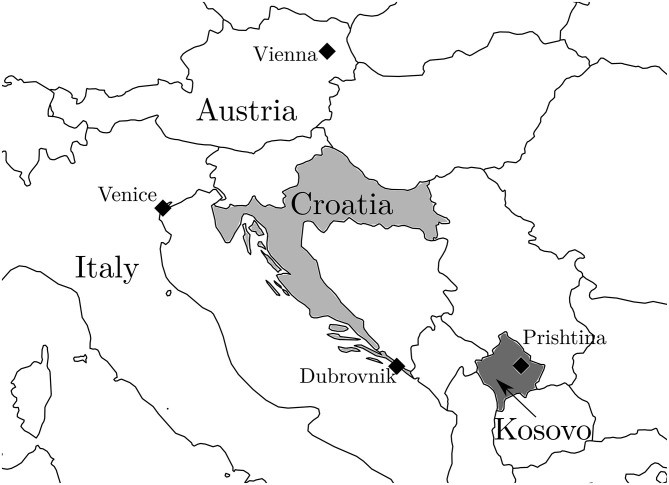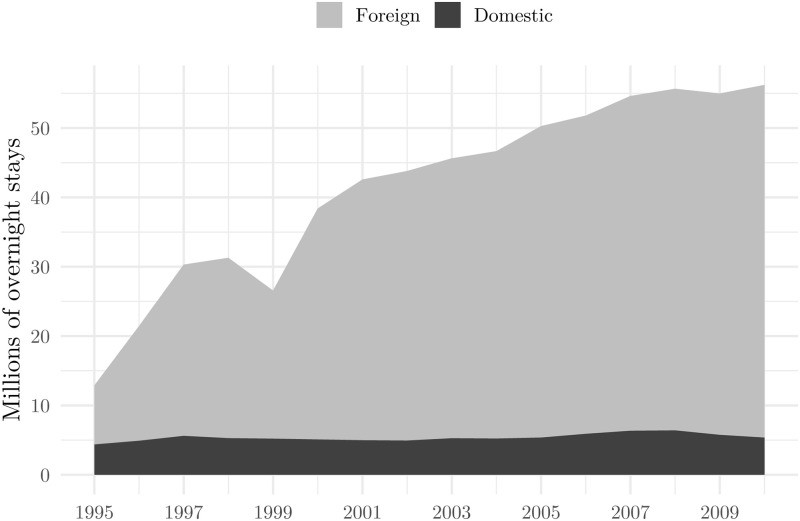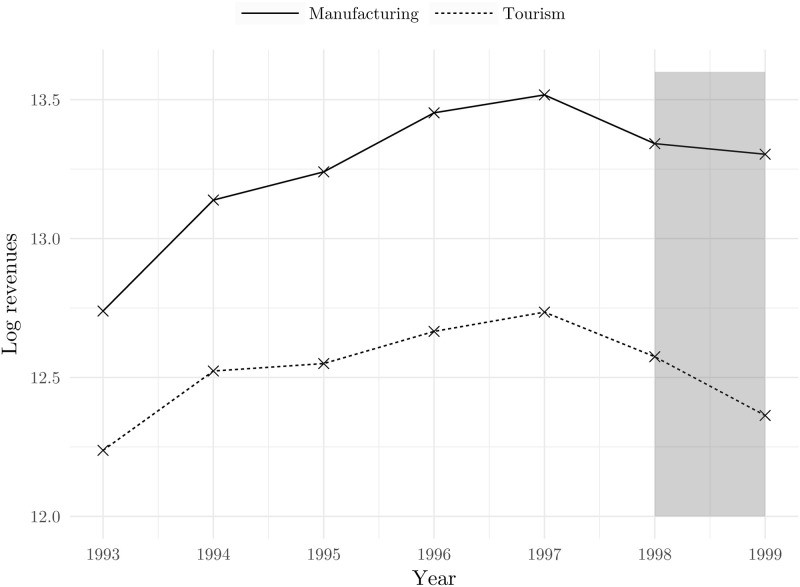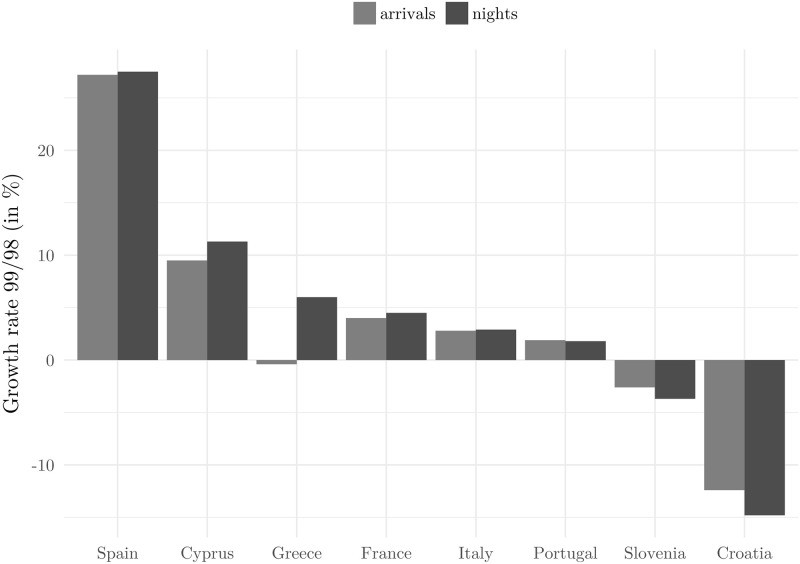Terrorism’s impact on tourism is significant, causing fear and uncertainty among travelers. SIXT.VN understands these concerns and offers reliable travel solutions in Vietnam. This article explores the far-reaching effects of terrorism on tourism and offers insights for safe and enjoyable travel planning. SIXT.VN are here to help with services like tourism consulting, airport pick-up, hotel bookings and Hanoi tours, we are committed to provide a seamless and secure travel experience in Vietnam.
1. What is the Impact of Terrorism on Tourism Globally?
Terrorism significantly impacts tourism by instilling fear, decreasing traveler confidence, and causing economic losses. According to research from the United Nations World Tourism Organization (UNWTO), terrorist attacks can lead to a sharp decline in tourist arrivals in affected regions, with recovery often taking several years.
Terrorist attacks create a perception of insecurity, leading potential tourists to choose safer destinations. This shift in demand can devastate local economies that heavily rely on tourism. Moreover, increased security measures and insurance costs can further strain the tourism industry.
Terrorism’s reach extends beyond immediate attack sites. Neighboring regions and countries may also experience a decline in tourism due to perceived instability. Media coverage plays a crucial role, shaping public perception and influencing travel decisions.
2. How Does Terrorism Affect Tourism in Specific Regions?
Terrorism’s impact on tourism varies significantly across different regions, depending on the frequency and severity of attacks, as well as the region’s overall stability and economic reliance on tourism.
- Middle East and North Africa (MENA): Regions like Egypt, Tunisia, and Turkey have experienced significant drops in tourism following terrorist incidents.
- Europe: Attacks in major cities such as Paris, London, and Barcelona have led to temporary declines in tourism, though recovery is generally faster due to strong infrastructure and diversified economies.
- Asia: Destinations like Bali and Mumbai have seen tourism affected by terrorist attacks, prompting increased security measures and efforts to reassure travelers.
3. What Are the Economic Consequences of Terrorism on Tourism Destinations?
The economic consequences of terrorism on tourism destinations are substantial, encompassing immediate revenue losses, long-term damage to brand reputation, and increased operational costs. According to a report by the World Travel & Tourism Council (WTTC), the tourism industry’s contribution to GDP can decline sharply in countries affected by terrorism, leading to job losses and reduced investment.
- Revenue Losses: Immediate cancellations and decreased bookings lead to significant revenue shortfalls for hotels, airlines, tour operators, and local businesses.
- Reputation Damage: Repeated attacks can tarnish a destination’s image, making it difficult to attract tourists even after security improves.
- Increased Costs: Enhanced security measures, higher insurance premiums, and marketing campaigns to restore confidence add to the financial burden on tourism businesses.
4. How Does Perceived Safety Influence Tourist Decisions After Terrorist Events?
Perceived safety is a critical factor influencing tourist decisions after terrorist events, with travelers often prioritizing destinations considered safe and stable. A study by the International Journal of Tourism Research found that perceived risk significantly impacts destination choice, with tourists more likely to avoid areas with a history of terrorist activity.
- Risk Perception: Tourists assess the risk level based on media coverage, government advisories, and personal experiences.
- Destination Choice: Safer destinations, often with lower perceived risk, become more attractive alternatives.
- Travel Insurance: Increased demand for travel insurance reflects heightened concern for safety and security.
5. What Strategies Can Tourism Businesses Use to Mitigate the Impact of Terrorism?
Tourism businesses can employ various strategies to mitigate the impact of terrorism, including enhancing security measures, diversifying markets, and implementing crisis communication plans. A report by the UNWTO highlights the importance of proactive risk management and resilience-building in the face of security threats.
- Enhanced Security: Implementing visible security measures, such as surveillance systems, security personnel, and baggage screening, can reassure tourists.
- Market Diversification: Targeting multiple source markets reduces reliance on any single region, minimizing the impact of travel advisories or economic downturns in specific areas.
- Crisis Communication: Developing a clear and timely communication strategy helps manage public perception and provide accurate information during and after a crisis.
6. How Can Governments Support the Tourism Industry in the Wake of Terrorism?
Governments play a vital role in supporting the tourism industry after terrorist events, through measures such as providing financial assistance, investing in security infrastructure, and launching marketing campaigns to restore confidence. According to the WTTC, government support is crucial for the industry’s recovery and long-term sustainability.
- Financial Assistance: Offering grants, subsidies, and tax relief can help tourism businesses weather the immediate financial crisis.
- Security Investment: Upgrading security infrastructure, training personnel, and enhancing intelligence gathering can improve safety and security.
- Marketing Campaigns: Launching targeted marketing campaigns to promote the destination as safe and welcoming can help restore its image and attract tourists.
7. What Role Does Media Coverage Play in Shaping Tourist Perceptions of Risk?
Media coverage significantly shapes tourist perceptions of risk, often influencing travel decisions more than actual statistical probabilities of incidents. Research from the Journal of Travel Research indicates that media sensationalism can amplify fear and uncertainty, leading to avoidance of destinations perceived as dangerous.
- Sensationalism: Dramatic and repetitive reporting can create a heightened sense of risk, even if incidents are isolated.
- Framing: The way media frames events (e.g., focusing on victim stories or security failures) can significantly impact public perception.
- Social Media: The rapid spread of information and opinions on social media can further amplify perceptions of risk, both positively and negatively.
8. How Do Travel Advisories Issued by Governments Affect Tourism Flows?
Travel advisories issued by governments have a direct and significant impact on tourism flows, often leading to immediate cancellations and a decline in bookings. A study by the U.S. Department of State found that travel advisories are a key source of information for travelers assessing the safety of international destinations.
- Cancellation of Bookings: When a government issues a travel advisory, many travelers immediately cancel their trips, especially if the advisory recommends avoiding non-essential travel.
- Insurance Implications: Travel insurance policies often become invalid in destinations with active travel advisories, further discouraging travel.
- Economic Impact: Destinations heavily reliant on tourism can experience significant economic losses due to reduced visitor numbers.
9. What is the role of safety and security in tourism?
Safety and security are indispensable in tourism, as they directly impact traveler confidence, destination choice, and the overall sustainability of the tourism industry. The International Civil Aviation Organization (ICAO) emphasizes that ensuring the safety and security of passengers, infrastructure, and operations is paramount for the continued growth and stability of global tourism.
- Traveler Confidence: Tourists are more likely to visit destinations where they feel safe and secure from potential threats, including crime, terrorism, and health risks.
- Destination Choice: Safety perceptions significantly influence destination choice, with travelers often opting for locations known for their stability and security measures.
- Economic Impact: Investing in safety and security enhances a destination’s reputation, attracting more tourists and bolstering the local economy.
- Sustainable Tourism: Long-term growth of tourism depends on maintaining a safe and secure environment, as negative incidents can deter visitors and damage the destination’s image.
10. What is Vietnam’s Tourism Safety Situation?
Vietnam is generally considered a safe country for tourists. The country has a low rate of violent crime, and the government is committed to ensuring the safety and security of visitors.
Vietnam’s tourism safety is maintained through several key factors:
- Low Crime Rates: Compared to many other countries, Vietnam has relatively low rates of violent crime. Petty theft, however, can be an issue in tourist hotspots.
- Government Initiatives: The Vietnamese government has implemented various initiatives to enhance tourist safety, including increased police presence in tourist areas and improved infrastructure.
- Cultural Norms: The Vietnamese culture is generally welcoming and respectful towards foreigners, contributing to a positive travel experience.
The U.S. Department of State currently assesses Vietnam as Level 1, advising travelers to exercise normal precautions. This indicates that Vietnam is considered a relatively safe destination.
SIXT.VN are committed to providing safe and reliable services to ensure a smooth and secure travel experience in Vietnam.
SIXT.VN: Your Trusted Partner for Safe and Enjoyable Travel in Vietnam
Planning a trip to Vietnam? SIXT.VN offers a range of services designed to make your travel experience seamless and secure:
- Tourism Consulting: Personalized travel itineraries tailored to your preferences and safety considerations.
- Airport Pick-Up: Reliable and safe transportation from the airport to your hotel.
- Hotel Bookings: Handpicked accommodations that meet high standards of safety and comfort.
- Hanoi Tours: Guided tours to explore the best of Hanoi with experienced and knowledgeable guides.
Ready to explore Vietnam with peace of mind? Contact SIXT.VN today!
Address: 260 Cau Giay, Hanoi, Vietnam
Hotline/WhatsApp: +84 986 244 358
Website: SIXT.VN
Embrace the beauty and culture of Vietnam with SIXT.VN, where your safety and satisfaction are our top priorities.
FAQ: Terrorism and Tourism
1. How can I stay safe while traveling in a world affected by terrorism?
Stay informed about potential risks by monitoring government advisories and local news. Choose reputable tour operators and accommodations, and avoid high-risk areas. Be aware of your surroundings and report any suspicious activity to local authorities.
2. Is it safe to travel to Vietnam given global terrorism threats?
Vietnam is generally considered a safe country for tourists, with a low rate of violent crime and a stable political environment. However, it’s always wise to stay informed about any potential risks and take necessary precautions.
3. What should I do if there is a terrorist attack during my trip?
Follow the instructions of local authorities and security personnel. Seek shelter in a secure location and stay informed through official channels. Contact your embassy or consulate for assistance, and let your family know you are safe.
4. How can travel insurance protect me from terrorism-related incidents?
Comprehensive travel insurance can cover medical expenses, trip cancellations, and emergency evacuations due to terrorist incidents. Check your policy’s terms and conditions to ensure it includes coverage for terrorism-related events.
5. What are the most common targets for terrorist attacks against tourists?
Common targets include popular tourist attractions, transportation hubs, hotels, restaurants, and public spaces. Being aware of these potential targets can help you make informed decisions and take necessary precautions.
6. How do I choose a safe destination for my vacation?
Research destinations thoroughly, considering factors such as political stability, crime rates, and terrorism threats. Check government travel advisories and consult reputable travel resources for up-to-date safety information.
7. What role do local communities play in ensuring tourist safety?
Local communities play a crucial role in ensuring tourist safety by being vigilant, reporting suspicious activity, and providing support to visitors in need. Respecting local customs and traditions can also contribute to a safer and more positive travel experience.
8. How do security measures at airports and tourist sites affect tourism?
While security measures can enhance safety and deter attacks, they can also create inconvenience and delays for travelers. Balancing security with a positive travel experience is essential for maintaining tourist satisfaction and encouraging tourism.
9. What is the psychological impact of terrorism on travelers?
Terrorism can cause anxiety, fear, and stress among travelers, leading to avoidance of certain destinations or changes in travel behavior. Addressing these psychological impacts through information, support, and reassurance is crucial for promoting tourism recovery.
10. How can tourism destinations recover after a terrorist attack?
Recovery strategies include enhancing security measures, launching marketing campaigns to restore confidence, providing support to affected businesses and communities, and promoting positive stories and experiences. Collaborative efforts between governments, tourism businesses, and local communities are essential for long-term recovery.
 Map of affected and surrounding areas
Map of affected and surrounding areas
Map of affected and surrounding areas highlights regions impacted by conflict, aiding in risk assessment for tourists.
 Tourist nights: Foreign and domestic tourists
Tourist nights: Foreign and domestic tourists
Foreign and domestic tourist nights graph helps visualize trends in tourism, showing potential effects of instability.
 Revenues of manufacturing and tourism industries
Revenues of manufacturing and tourism industries
Manufacturing and tourism revenues comparison demonstrates the economic impact of events on different sectors.
 Tourist arrivals and nights spent: Competition
Tourist arrivals and nights spent: Competition
Tourist arrivals and nights spent in competitive countries show the shifts in travel preferences post-conflict.



